Success Stories

Pakistan
Antigua Forum 2013
Pakistan
Antigua Forum 2013

Azhar Aslam is a plastic surgeon with a practice in London and deep ties to his home country of Pakistan, where he is an active philanthropist. He’s also the developer of the Speed Literacy Program, which gives illiterate children the basics of reading and writing after six months of studying only a few hours per day.
Azhar came to the Antigua Forum with a problem: How to dramatically scale a tool that’s been proven to work with a few dozen children in Pakistan, when the country has twenty million young people and many of them are illiterate?
Working with a team of participants at the Antigua Forum, Azhar quickly realized that it would not be enough to simply hire teachers or raise funds. Azhar and team evaluated strategies and options, then developed an approach that focuses on strategic partnerships to achieve broad distribution at low cost, along with better tailoring of the program to meet the needs of users.
Since his participation at the Antigua Forum, Azhar has taken the Speed Literacy Program to new levels. Important design changes include modifications that make the curricula available to multiple audiences, including children who are not enrolled in school (the poorest families cannot afford for their children to study full-time) as well as children who are studying within existing schools in Pakistan (often with very limited resources).
Examples include an intensive program for largely illiterate children at a camp for Pakistanis displaced by the Taliban, where ninety-five students achieved elementary proficiency in a four-month period. To reach other children outside the country’s existing school system, Azhar’s program has built ten low-cost centers that teach literacy in the national language of Urdu, provide an introduction to English, and also teach basic life skills.
While these high-profile efforts help the neediest children, the Speed Literacy Program expands its reach most effectively through the use of strategic partnerships. Recently, Azhar signed a MOU with one of Pakistan’s regional governments for a program that will reintegrate children who have fallen away from school. Another regional government also is considering a similar proposal. In addition, Azhar and team are far along in talks with the country’s federal institute of Madrassas and the Pakistani Red Crescent to establish educational centers that would use the Speed Literacy Program to reach many, many more children.
“ During the exercise that we performed in dissecting my project and rebuilding it to see the long-term tangible benefits, I could see the model for the first time as an outsider. With the help of other delegates, we dissected it into fine details to see what was working well and what was not. ”
- Azhar Aslam,
Pakistan

United States
Antigua Forum 2014
United States
Antigua Forum 2014

Mickey Costa and James Schuler came to Antigua Forum 2014 with a project to transform how politicians and political causes get access to money, especially from smaller donors. They left with an idea for a project to transform how another group gets access to money—the billions of people across the world with no bank accounts and little if any credit.
At the Antigua Forum, these young entrepreneurs learned from experts about challenges facing the unbanked. They also learned about Bitcoin and had detailed technical discussions about the workings of digital currencies. They soon saw a chance to help a lot of people.
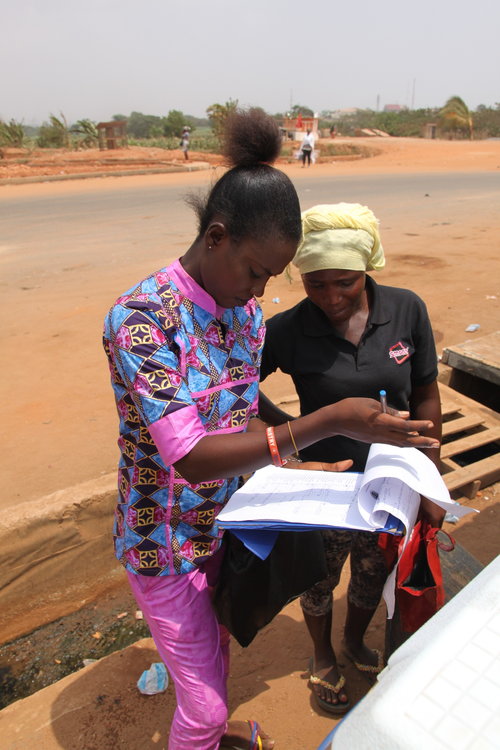 Back home, Mickey and James called on new friends and mentors from the Antigua Forum who were excited to help. Ruth Richardson, former minister of finance in New Zealand, provided regular advice along with introductions to executives in financial institutions and in regulatory agencies. Soon, Mickey and James had a working prototype of a Bitcoin-based debit card. John Chisholm, a serial entrepreneur and venture capitalist who they’d also met in Antigua, helped them show the prototype to investors in Silicon Valley. By the fall of 2014, they had their first funding, from a prominent Silicon Valley VC they met through John.
Back home, Mickey and James called on new friends and mentors from the Antigua Forum who were excited to help. Ruth Richardson, former minister of finance in New Zealand, provided regular advice along with introductions to executives in financial institutions and in regulatory agencies. Soon, Mickey and James had a working prototype of a Bitcoin-based debit card. John Chisholm, a serial entrepreneur and venture capitalist who they’d also met in Antigua, helped them show the prototype to investors in Silicon Valley. By the fall of 2014, they had their first funding, from a prominent Silicon Valley VC they met through John.
Next, they called Michael Strong, another new friend and mentor from Antigua Forum, who introduced them to his wife, Magatte Wade, a successful entrepreneur from Africa. Mickey and James soon were testing a pilot in Magatte’s home country of Senegal. It was a big success.
From here, they raised an additional $2 million from VC firms on both sides of the Atlantic, then took their model to Ghana, with a larger team and an improved banking system powered by Bitcoin’s Blockchain. They call it Atlas Money. In Ghana, Mickey and James have partnered with financial intermediaries and are pioneering a share economy model for banking in which local trusted community members can become branchless banks, creating a decentralized financial network powered by the people. These “microbanks” can now begin to earn more money than they ever dreamed, all while financially including and benefitting those around them.
Today, Mickey and James have a staff of twenty and plan to expand to other countries. They soon will raise Series A funding from investors, funds, and financial institutions around the world. With Atlas Money, they’re just getting started, creating a world where people can finance each other and bypass inefficient banks, and where financial services will be ubiquitous and cheap.
“ Antigua Forum was invaluable for coming up with the idea and for coming in contact with investors. The environment and the processes used, along with all these great minds, really helped. In that environment you feel compelled to think big... It all started on a napkin in Antigua. ”
- Mickey Costa and James Schuler,
United States

Honduras
Antigua Forum 2012
Honduras
Antigua Forum 2012

Ebal Díaz almost didn’t make it to the Antigua Forum gathering in 2012. As the legislative secretary of the Honduran congress, he was a busy man. He was someone more likely to advise the politicians and make things happen from behind the scenes than be the face of a reform. He spoke English with a strong accent. But Ebal also was a fast learner and a good listener, with a keen understanding of what needed to be done in his country.
At the Antigua Forum, Ebal was introduced to a whole new way of thinking about issues that mattered deeply to him and his country, especially education. Jeff Sandefer brought experience as an entrepreneur who had built private schools and a reformer who had proposed huge changes in education. Jeff had a project to build schools that empower children to take responsibility for their own education. Ebal’s many conversations with Jeff and a few other participants, including Nobel Prize–winning economist Vernon Smith, were transformative.
When Ebal returned from the Antigua Forum, he told friends, “I’ve figured it out. I know what we have to do regarding education reform.” He assembled a team to craft a huge reform package, and brought in experts to help out in specific areas. Ebal’s core take away from the Antigua Forum was that in education, the rights of families come first, and that families should have a wide range of possibilities for educational methods.
The big reform package was passed in 2012 with legislation that establishes a framework for education. The next step was to design regulations allowing for flexibility. In the new law, innovative approaches such as unschooling and homeschooling had gone unnoticed. Ebal quickly put together an international coalition to draft regulations that would allow these practices, which all but one have received legislative approval.
The reform that Ebal led after the Antigua Forum has fundamentally changed education in Honduras. Today, the country’s education department and its tax authorities have tighter controls. Transparency International has a role in oversight. For the first time in more than a decade, public schools operate two hundred days per year, and in 2018 public school teachers will be required to hold a university degree.
Most importantly, this reform lets parents decide how, where, and by whom their children are educated. It has opened the door for experimentation, adaptation, and leveraging technology. The potential is so great that it convinced education pioneer James Tooley to move to the Honduran capital of Tegucigalpa in 2016, where he’s starting a network of bilingual (Spanish/English) schools. Each school is designed for five hundred students. The $100 monthly tuition includes textbooks on computer tablets as well as home Internet connection. The first school is open and more are planned.

United States
Antigua Forum 2016
United States
Antigua Forum 2016

Jason Heckathorn came to Antigua Forum 2016 as an entrepreneur with big challenges. As CEO of Forever Oceans, he was leading the transition of a sophisticated technology from a Fortune 500 defense industry giant into commercial mariculture. The firm was building a new type of fish farm focused on warm water species that could be autonomously farmed in the open oceans in an environmentally friendly way. The implications—increased food production, more economic development, lower environmental impact—were huge.
Jason connected with the Antigua Forum thanks to Art Chait, then-president of the event and a mentor at Stanford University’s StartX Accelerator. Jason was already working with Stanford’s StartX to spin off Forever Oceans from its Fortune 500 parent. In speaking with Art, it became clear that the potential global impact of Forever Oceans, and the political and economic challenges the firm faced, made it a great candidate for the Antigua Forum.
Jason needed advice. How to build a base of international finance partners? How to grow the business in a global market with political and economic risks that vary dramatically by country and region? How to sell the model to investors as well as host governments?
With help from his facilitator, Jason shared the firm’s business opportunity, its values of economic and environmental sustainability, and its challenges. The feedback came from many directions. Dan Grossman, an entrepreneur and board member at Atlas Network, pointed out that Forever Oceans had been focused on ventures in developing countries with warm waters, yet there could be value in pursing ventures in countries with strong rule of law. Along with other participants, they analyzed the politics and economics of business in regions as diverse as the South Pacific, South America, and Northern Europe. Then they dug deeper, conceiving and outlining a demonstration center for potential finance partners to see their innovative model without distracting on-going operations.
Less than a year after Jason came to the Antigua Forum, Forever Oceans launched a new demonstration center and its first European operations. Both have been big hits. Now the firm can give potential partners a clear picture of the technology and its possibilities. One of the new partners, Rodolfo Milani, was part of the group of participants advising Jason at the Antigua Forum. His group subsequently became the finance partner for Forever Oceans in a major Central American country. Two more operations are launching now.
Food security is a global challenge that will require decades to address. Forever Oceans has a great first-mover advantage, but every venture and every market presents its own challenges. Fortunately, the Antigua Forum equipped Jason and his team with a set of global relationships, from New Zealand to Ecuador and beyond, and ideas on how to make the most of the political and economic challenges that lie ahead.
“ Time and expertise are always in short supply. The incredible thing about the Antigua Forum was that I could get both—productive time, working with experts from across the globe—all in a single location. ”
- Jason Heckathorn,
United States
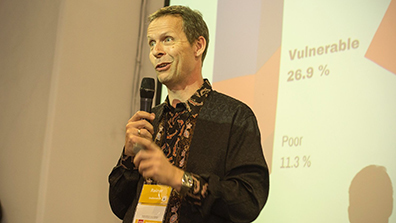
Indonesia
Antigua Forum 2016
Indonesia
Antigua Forum 2016

Rainer Heufers knew what he wanted to do well before he arrived at the Antigua Forum 2016 gathering. As a policy expert and former representative for the Friedrich Naumann Foundation in Asia, he understood how bad policies hurt good people. As founder of the Center for Indonesian Policy Studies, he knew what policies most hurt Indonesians, especially the poor and vulnerable.
Rainer pitched a simple message: Over a third of Indonesia’s population of 250 million live on $100 or less per month per family. Spending up to 70 percent of their income on food, they waste $20 per month—a fifth of their household income—on food prices that have been inflated by tariffs and quotas. Eliminating these tariffs and quotas would save these poor and vulnerable families up to $6 billion every year. Rainer asked for help to change this unjust system.
Before he arrived in Antigua, Rainer’s project had already been conceived. Both the need and opportunity were clear.
 Help for Rainer came from many directions. It started before he arrived at the gathering, was intense while in Antigua, and continued after he returned home. Rainer’s facilitator continually asked questions that laid out key assumptions and helped him focus. As part of the Antigua Forum process, he pitched his project to the entire group. He watched as participants gravitated to the other projects. Then Ruth Richardson, former minister of finance in New Zealand, sat down at his station. Rainer had hit the jackpot. For the entire morning, he got a one-on-one intensive coaching session on how to develop and execute a reform strategy from one of the world´s most successful free-market reformers.
Help for Rainer came from many directions. It started before he arrived at the gathering, was intense while in Antigua, and continued after he returned home. Rainer’s facilitator continually asked questions that laid out key assumptions and helped him focus. As part of the Antigua Forum process, he pitched his project to the entire group. He watched as participants gravitated to the other projects. Then Ruth Richardson, former minister of finance in New Zealand, sat down at his station. Rainer had hit the jackpot. For the entire morning, he got a one-on-one intensive coaching session on how to develop and execute a reform strategy from one of the world´s most successful free-market reformers.
The help kept coming. Another participant, from a major foundation, brought knowledge about how to structure a reform project within a nonprofit. John Nixon, an accomplished fiscal reformer, pushed Rainer for numbers that convey real human need at the individual or family level (the statistics listed above came out of that conversation). An expert in social media helped Rainer focus on shorter, punchier videos. Barbara Oakley, founder of one of the most popular MOOCs (massive open online course) in the world, gave tips for how to incorporate this powerful tool into the project’s overall strategy. They continued the conversation via e-mail after the event in order to ensure that Rainer took all the right steps going forward.
Rainer is back in Indonesia executing the strategy developed in Antigua. The news is good. A little over half a year after the Antigua Forum, on-going conversations that started at this gathering resulted in a six-figure donation from the John Templeton Foundation to the Center for Indonesian Policy Studies to give this project the backing it needs for research and advocacy. A few months later, the project won the Atlas Network’s 2016 Think Tank Shark Tank competition, with a $25,000 prize that will be used to support the MOOC.
“ The Antigua Forum starts accelerating before the event. My team at home really had to step up. There was a big impact even before getting to Antigua. Knowing you have to pitch; that someone will be assigned to work with you; that very experienced people are coming—it applies a lot of pressure to come with a well-defined idea. ”
- Rainer Heufers,
Indonesia

United States
Antigua Forum 2015
United States
Antigua Forum 2015

When Vidar Jorgensen attended his first Antigua Forum gathering, in January 2015, he hadn’t planned on bringing a project. As majority owner of three companies that manage over two hundred conferences annually, he was happy to simply contribute to others’ projects. But as co-founder of the microfinance organization Grameen America, he also was hoping to get ideas for a new venture to make both finance and health care available to low-income populations. He decided to pitch a project.
Vidar told the Antigua Forum participants how Grameen America has built upon Grameen Bank, which together with Muhammad Yunus won the 2006 Nobel Peace Prize for pioneering efforts in microfinance. In the United States, Grameen America successfully provides loans to mostly poor immigrant women for income-producing activities. These same women and their families obtain health care at high-cost, low-quality clinics. Vidar and his team were in the process of establishing Grameen PrimaCare as a nonprofit that would serve this market in Queens, New York. The venture was early stage, with many questions.
The Antigua Forum participants worked with Vidar to come up with strategies and solutions. Digging deeply, it soon became clear that Grameen PrimaCare and Grameen America should have a common leadership that aligns the interests of both organizations. Participants also drew on lessons from other countries on how to support the health of low-income populations. These included strategies on how to blend health care with other valuable services, such as tips on where to find stores that sell day-old bread or reduced-price produce. Such services help attract new customers to the member-based clinic, and encourage them to come for care. Other recommendations focused on a number of low-cost activities, such as bottle collection, to help fund the project while building a sense of community. Vidar was surprised by how many ideas never would have occurred to him. Then he went home and implemented them.
When Vidar came to the Antigua Forum, Grameen PrimaCare was just getting started. A year and a half later, it had seven hundred members. There is still a lot of work to be done, but Grameen PrimaCare is moving in the right direction as a separate legal entity that is closely coordinated under the leadership of Grameen America president and CEO Andrea Jung.

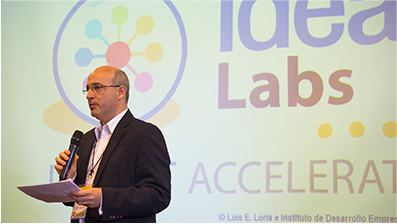
Costa Rica
Antigua Forum 2016
Costa Rica
Antigua Forum 2016

At the Antigua Forum 2016 gathering, Luis presented IDEAS Labs – IMPACT Accelerator, a project designed to foster market-liberal public policy reforms. He leads this project through the Institute for Enterprise Development and Social Action (IDEAS), where he is president.
Prior to the Antigua Forum, Luis already had presented IDEAS Labs – IMPACT Accelerator to different groups, including Atlas Network’s Liberty Forum. His mentor from Atlas, Juan José Daboub, encouraged him to attend the Antigua Forum. Luis arrived with the outline for a simple yet powerful program: choose important policy areas; request proposals for reforms from a broad audience; choose the best proposals; develop strategies for these proposals to succeed; and then execute these strategies.
At the Antigua Forum, Luis worked with his facilitator and participants to identify thirteen policy priorities, including education, poverty abatement, public health, regulatory policy, tax policy, and more. The project faced multiple challenges. How would the best proposals be accepted? How could the public be included in the selection process? How to mentor selected project owners to increase their chances of success? How to introduce these projects into the political process? Luis left the Antigua Forum with a clear strategy and an action plan.
Back in Costa Rica, Luis began to execute his strategy. It was then that #RevoluciónCR was born. After a single, well-received event in July, ideas started coming in. Three months later there were over six hundred proposals. Luis and team will select the three most promising proposals in each priority, resulting in thirty-nine finalists, which will be judged by the public to determine the thirteen final projects. Voting will be open to all citizens of Costa Rica via an Internet-based platform. In March 2017, project owners will attend an event and work with experts to improve their projects and help them execute them. The event will use a format and facilitators from the Antigua Forum.
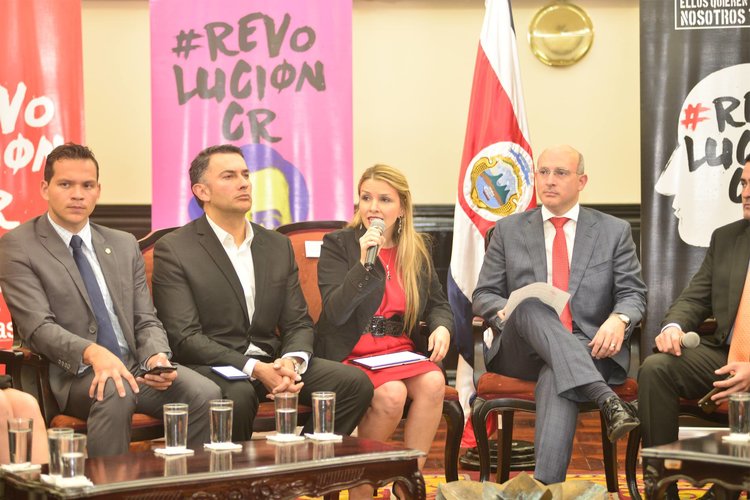 #RevoluciónCR has gained attention from government leaders, NGOs, academics, community leaders, and the press. Recently, Luis and IDEAS signed an MOU with Costa Rica’s Ministry of Commerce to help reform key policies. The country is applying for membership to the OECD and there are important requirements related to public policy reforms. Luis and team will help the government to develop reforms needed to meet the economic criteria for membership in the OECD, and to do this they will apply the IDEAS Labs – IMPACT Accelerator methodology.
#RevoluciónCR has gained attention from government leaders, NGOs, academics, community leaders, and the press. Recently, Luis and IDEAS signed an MOU with Costa Rica’s Ministry of Commerce to help reform key policies. The country is applying for membership to the OECD and there are important requirements related to public policy reforms. Luis and team will help the government to develop reforms needed to meet the economic criteria for membership in the OECD, and to do this they will apply the IDEAS Labs – IMPACT Accelerator methodology.
Continuing his path of creative innovation, Luis will launch, by early 2017, Don Lucho, a new brand of beer that embodies the ideas of #RevoluciónCR. Don Lucho, which refers to someone who fights for what’s right, is expected to raise awareness for public policy reform.

Panama
Antigua Forum 2014 and 2015
Panama
Antigua Forum 2014 and 2015

Surse Pierpoint came to the Antigua Forum 2014 gathering with a big idea. A native of Panama and the general manager of the association representing the country’s free trade zone, he was witness to how markets and trade improve the well-being of people. He also was aware of the gut-wrenching poverty that characterizes the Colón neighborhood adjacent to the Canal Zone. He asked the Antigua Forum participants to help him sell Panama’s political leadership on a free trade zone for one of the poorest areas of his country.
Surse left the 2014 gathering with a strong pitch to sell his idea to the presidential candidates from the country’s three main political parties. He went home and spent the next few months marketing his idea, and all three of these parties and their candidates heard him. In May of that year, the candidate who won was the first to embrace the idea and the most vocal about the need to do something for Colón. After he was elected, President Varela named Surse the co-chairman, with the minister of finance, of the committee to establish rules for a free trade zone in this area.
Soon faced with a new set of challenges—as the “dog that caught the bus” he now had to figure out what to do—Surse reminded himself of the questions that had been raised at the Antigua Forum for projects that were further along. Then he asked to return to Antigua Forum in 2015.
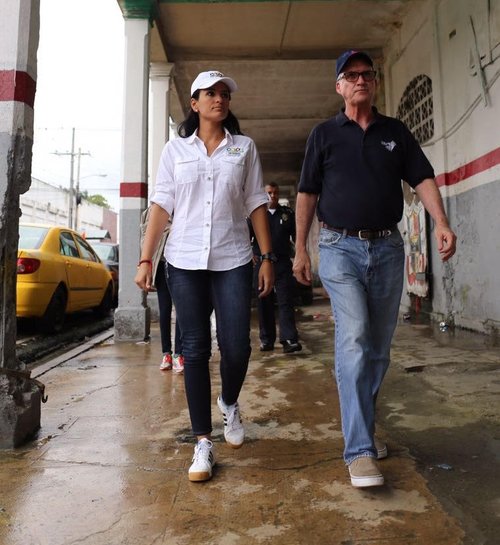 Once again working with a team of talented and committed participants, Surse and friends came up with a strategy to address the challenges his new project would face. In particular, multiple constituencies would have an opinion about the possible free trade zone, including leaders from the business sector and political, religious, and community leaders. How could the project come to fruition with a set of rules that would allow trade to flourish? Surse left the Antigua Forum with a strategy that he could put in place immediately, as well as lessons that he could draw upon in the months ahead.
Once again working with a team of talented and committed participants, Surse and friends came up with a strategy to address the challenges his new project would face. In particular, multiple constituencies would have an opinion about the possible free trade zone, including leaders from the business sector and political, religious, and community leaders. How could the project come to fruition with a set of rules that would allow trade to flourish? Surse left the Antigua Forum with a strategy that he could put in place immediately, as well as lessons that he could draw upon in the months ahead.
In March 2016, the Panamanian congress passed, and the president signed into law, clear rules to establish the Colón Puerto Libre. Investment is now coming to this new zone.
“ I’m constantly reflecting on our discussions when I’m in meetings to work on this project. I hear the voices of my friends from Antigua Forum–‘Watch out for this!’ ‘Don’t forget about that!’–and then I avoid saying something I shouldn’t, or I make a suggestion that helps move things along. ”
- Surse Pierpoint,
Panama
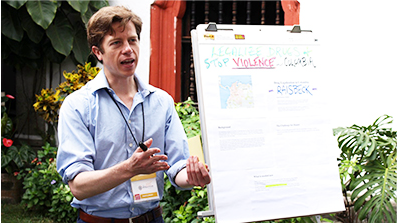
Colombia
Antigua Forum 2015 and 2016
Colombia
Antigua Forum 2015 and 2016

Daniel Raisbeck came to the Antigua Forum 2015 gathering with an unusual and ambitious project. He wanted to decriminalize drugs in his home country of Colombia to break the decades-long cycle of violence and corruption. He left with a communications strategy as well as a better understanding of how to think like an entrepreneur to promote reforms.
 Back home, Daniel applied the entrepreneurial thinking he learned at Antigua Forum and calculated that in an election year he could have the most effect on the policy debate by entering politics. He quickly pivoted from a single-issue reform agenda and decided to run for mayor of Bogotá, one of the highest-profile political roles in the country. While the odds of winning were low, he collected enough signatures to be listed on the ballot and appear regularly in debates, where he consistently made the case for economic freedom.
Back home, Daniel applied the entrepreneurial thinking he learned at Antigua Forum and calculated that in an election year he could have the most effect on the policy debate by entering politics. He quickly pivoted from a single-issue reform agenda and decided to run for mayor of Bogotá, one of the highest-profile political roles in the country. While the odds of winning were low, he collected enough signatures to be listed on the ballot and appear regularly in debates, where he consistently made the case for economic freedom.
After the election in November 2015, which he lost, Daniel spoke with many business and community leaders who were attracted to his ideas. While some wanted to launch a new political party, Daniel saw an opportunity to start a broader conversation.
Daniel returned to Antigua Forum in January 2016 and reconnected with Surse Pierpoint, who mentioned his role with the Bastiat Society, an international organization that connects business leaders with market liberal ideas. Daniel followed up and soon was in charge of launching the Bastiat Society’s chapter in Colombia, which he now leads.
In addition to public speaking, after the 2015 election Daniel also started writing for the PanAm Post, an online news and opinion magazine. Shortly before attending the Antigua Forum 2016 gathering, he learned that the magazine’s owners were considering a change in leadership and that they also wanted to include more high-profile interviews. Daniel used his participation at the Antigua Forum to interview influential and well-regarded participants.
Given his role as an experienced and principled political candidate, writer, and interviewer, the decision was made to appoint Daniel chief editor. In this role, Daniel says he’s applying what he’s learned at the Antigua Forum to run the PanAm Post as a sustainable business, regularly trying experiments to better communicate ideas. One year after becoming the new editor, he has the publication back on its feet with page views up from half a million to almost two million per month.
“ At the Antigua Forum I pitch my project ideas to Silicon Valley entrepreneurs who are really tough. If I can handle their criticisms and feedback I can handle Colombian politicians. ”
- Daniel Raisbeck,
Colombia
